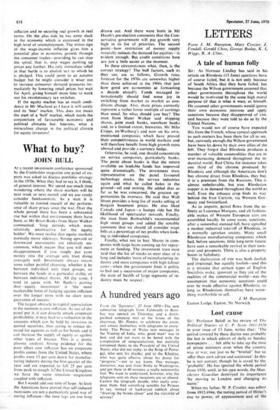LETTERS
From I. M. Rampton, Mary Crozier, I. Fendall, Gerald Choo, George Buday, K. I, Wiggs, R. A. Cline.
A tale of human folly
Sir: As Norman Lindley has said in his article ou Rhodesia (13 June) sanctions have of course failed, but it is not only because of South Africa that they have failed, but because the Wilson government assumed that other governments throughout the world would be motivated by the same high moral purpose (if that is what it was), as himself. He assumed other governments, would ignore their own economic interests and apply sanctions because they disapproved of UD1, and because they were told to do so by the United Nations.
You would not of course have expected this from the French, whose cynical approach to such matters has been there for all to see, but, curiously enough,the Wilson government have been let down by their own allies of the left. They forgot that Rhodesia produces a number of valuable commodities that are in ever-increasing demand throughout the in- dustrial world. Red China for instance takes one third of the chrome produced by Rhodesia and although the Americans don't buy chrome direct from Rhodesia, they buy it at a premium from the Russians. This is almost unbelievable, but true. Rhodesian copper is in demand throughout the world as well. Even the tobacco crop finds its way behind the Iron Curtain, via Western Ger- many and Switzerland.
As to imports, petrol flows from the re- finery at Laurenco Marques, and all fashion- able makes of Western European cars are assembled locally. In some cases, sanctions, after a somewhat stunned lull, have signalled a modest industrial take=off of Rhodesia, in a normally agrarian society. Many small Rhodesian manufacturing companies which had, before sanctions, little long-term future, have seen a remarkable revival in their turn- over and prospects. There is also a property boom in Salisbury.
The declaration of UM was both foolish and irrational, but equally foolish—and this is a mistake that certain types of English Socialists make, ignorant as they are of the realities of the commercial world—was the assumption that economic sanctions could ever be made effective against Rhodesia, so long as Rhodesians themselves have some- thing worthwhile to sell.






























 Previous page
Previous page